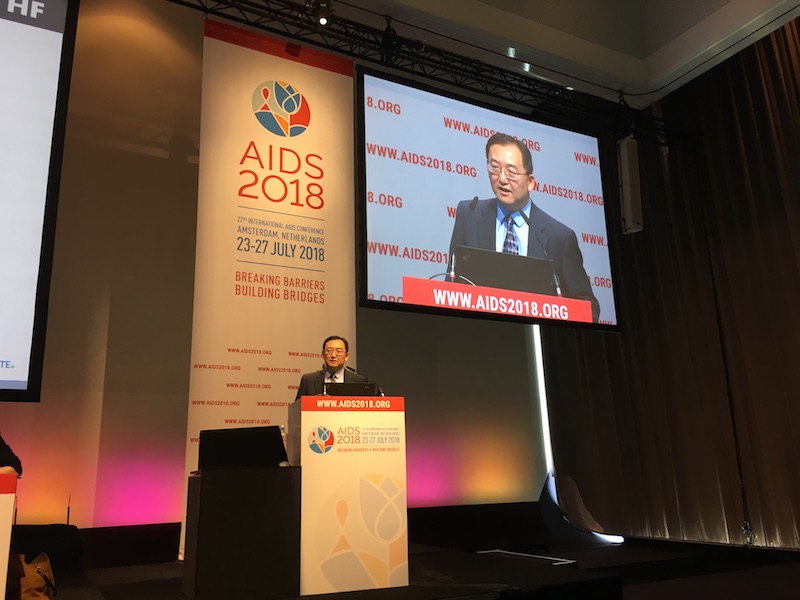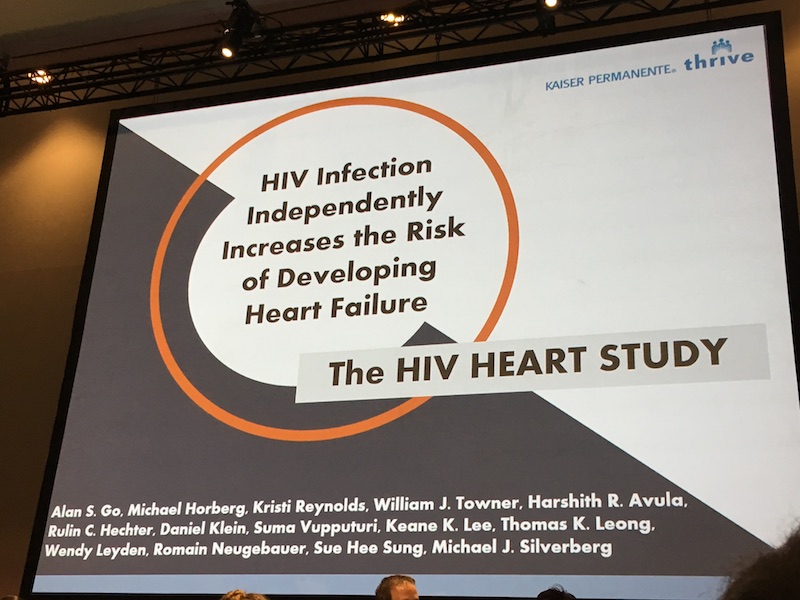Kaiser Permanente Division of Research scientists recently presented new research on associations between hazardous drinking, heart failure and HIV at the International AIDS Conference in Amsterdam.
Alan Go presenting research at AIDS 2018 conference

Kaiser Permanente Division of Research investigator Alan Go, MD, recently presented research co-led with colleague Michael Silverberg, PhD, at the International AIDS Conference in Amsterdam [Click here to watch Go’s presentation]. The conference is the largest on any global health issue in the world, and Go’s talk was a featured presentation. The conference first convened during the peak of the AIDS epidemic in 1985 and continues to provide a unique forum for the intersection of science, advocacy and human rights.
HIV linked to increased heart failure risk

The presentation, titled “HIV Infection Increases the Risk of Developing Heart Failure,” covered their study of a large, diverse, community-based population that evaluated the independent association of HIV infection with incident heart failure. Heart failure, or the inability of the heart to meet the body’s demands, has not been extensively studied in this population. Heart failure affects 26 million people worldwide and about 6 million people in the United States, where it is the leading cause of hospitalization in older persons. This is a concern for people with HIV — about 34 million worldwide and 1.1 million adults in the United States — who are now surviving into older ages, where they endure an increasing risk of a wide range of age-related comorbid conditions. Here, Dr. Go and colleagues reported that people with HIV endured an approximately 70 percent higher risk of developing heart failure compared to people without HIV, independent of traditional cardiovascular risk factors.
Study rules out atherosclerotic disease pathways as mechanism

The use of data from electronic health records also allowed the investigators to conclude that the higher heart failure risk in people with HIV “does not appear mediated through atherosclerotic disease pathways or differential use of cardiopreventive medications,” Go reported. The research is part of the HIV HEART study, sponsored by the National Heart, Lung and Blood Institute, which investigated heart failure and its possible contributing factors among people with HIV receiving care in three Kaiser Permanente integrated healthcare delivery systems in Northern California, Southern California and the US mid-Atlantic states between 2000 and 2016. The medical news website MedPage Today reported on Go’s presentation.
More Division of Research work presented at AIDS 2018

Go also participated in a panel on continued challenges in noncommunicable diseases, where he lent his expertise in the field of cardiology. Other studies have observed an excess risk of certain cardiovascular complications in people with HIV, attributed primarily to traditional risk factors, and the effects immunosuppression and use of certain antiretroviral therapies.
Implications of HIV HEART Findings
Go told the audience that there “needs to be greater awareness of heart failure as a possible explanation for relevant symptoms among people with HIV to facilitate timely evaluation and treatment.”
Silverberg noted that “It is remarkable that we are now in the position to present results at the International AIDS meeting on the risk of heart failure, which reflects how far we have come with the now near-normal lifespan of people with HIV.”
As for future research, Go and Silverberg will study potential HIV-specific mechanisms and the effectiveness of strategies to prevent heart failure or mitigate adverse outcomes after developing heart failure in the setting of HIV infection.
Silverberg was also busy at the conference, with two poster presentations on his work: “Association between changes in hazardous drinking and subsequent antiretroviral medication adherence, HIV viral control, and condomless sex” and “Hazardous alcohol screening rates among persons with HIV following implementation of screening, brief intervention and referral to treatment in a large healthcare system in the United States.”




This Post Has 0 Comments